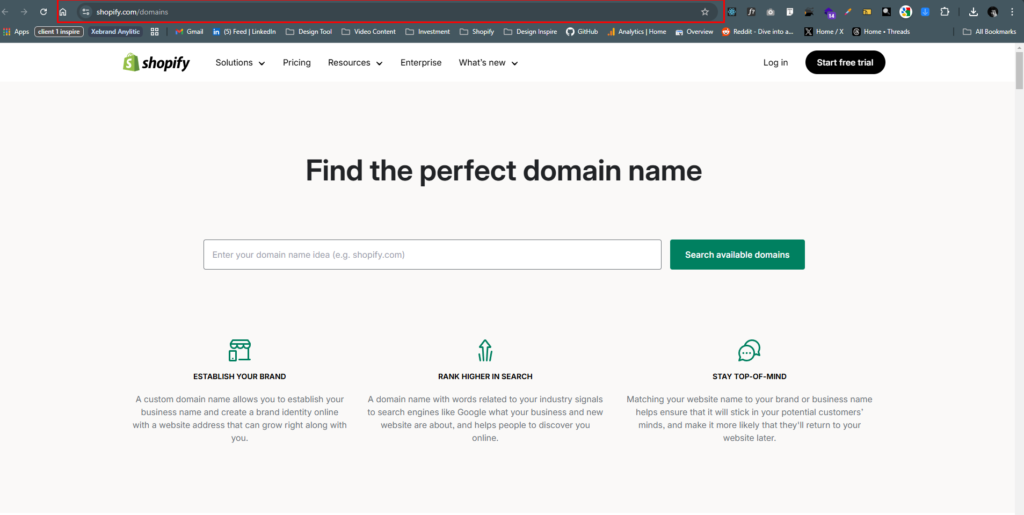In the ever-evolving e-commerce landscape, choosing the right platform can make or break your business. One of the most common dilemmas is deciding whether to use a Shopify website domain or explore other e-commerce platforms. Each comes with unique strengths, but the decision ultimately hinges on your goals, technical expertise, and business model.
In this guide, we’ll dive deep into the pros and cons of Shopify domains compared to other e-commerce platforms, answer frequently asked questions, and equip you with the knowledge to make an informed decision.

Introduction: The Importance of Choosing the Right E-commerce Platform
Your e-commerce platform serves as the backbone of your online store. It dictates how you manage products, interact with customers, and grow your business. Shopify stands out as a dedicated e-commerce solution, but is it the right choice compared to platforms like WooCommerce, BigCommerce, or Wix?
Understanding the pros and cons of Shopify domains in comparison to other platforms is crucial for creating a sustainable and scalable online business.
What is a Shopify Website Domain?
A Shopify website domain is the branded web address provided by Shopify for hosting your online store. While Shopify allows you to purchase a custom domain or connect an existing one, every store starts with a default Shopify subdomain (e.g., storename.myshopify.com).
With this domain setup, Shopify manages hosting, SSL certificates, and all technical configurations, making it ideal for beginners and seasoned merchants alike.
Pros of Using a Shopify Website Domain
1. User-Friendly Setup
Shopify is designed for simplicity. With a few clicks, you can set up a store, purchase a domain, and start selling products—no coding required.
2. Built-In Hosting and Security
Shopify offers reliable hosting, fast load speeds, and free SSL certificates. This ensures your site is secure and compliant with data protection standards.
3. Scalability
Whether you’re a small business or scaling to thousands of orders per day, Shopify adapts to your needs with advanced tools, apps, and integrations.
4. Robust E-Commerce Features
Shopify is tailor-made for online selling, offering features like inventory management, payment gateways, and abandoned cart recovery.
5. Access to Free Pre-Built Sections
With tools like Xebrand Shopify Section, you can elevate your store’s design using free, pre-built sections that save time and enhance your store’s appeal.
Cons of Using a Shopify Website Domain
1. Transaction Fees
Unless you use Shopify Payments, you’ll incur additional transaction fees, which can add up for high-volume sellers.
2. Limited Customization
Compared to open-source platforms like WooCommerce, Shopify has restrictions on customization unless you’re proficient in Liquid (Shopify’s coding language).
3. Higher Monthly Costs
Shopify plans start at $29/month, which can be pricier than alternatives, especially when you add premium apps.
4. Dependence on Shopify Ecosystem
If you ever decide to switch platforms, migrating your store can be a complex process.
How Does Shopify Compare to Other E-commerce Platforms?
1. Shopify vs. WooCommerce
- WooCommerce: An open-source plugin for WordPress, offering complete customization. However, it requires technical knowledge for setup and maintenance.
- Shopify: More beginner-friendly, with pre-configured features and reliable support.
2. Shopify vs. BigCommerce
- BigCommerce: Similar to Shopify but better suited for larger enterprises with advanced built-in features.
- Shopify: Easier for small-to-medium-sized businesses looking for a user-friendly experience.
3. Shopify vs. Wix
- Wix: Ideal for building websites with simple e-commerce capabilities.
- Shopify: Better for businesses prioritizing robust e-commerce features and scalability.
Frequently Asked Questions
1. Is a Shopify domain good for SEO?
Yes, Shopify domains come with built-in SEO features such as meta tags, mobile optimization, and fast load speeds. However, platforms like WooCommerce offer more advanced SEO plugins.
2. Can I connect a custom domain to Shopify?
Absolutely! Shopify allows you to purchase a custom domain directly or connect one from third-party registrars.
3. Are Shopify domains secure?
Yes, Shopify includes free SSL certificates, ensuring your website is safe for transactions.
4. How much does Shopify charge for domains?
Shopify domains typically cost $14–$25 per year, depending on the extension (.com, .store, etc.).
5. Is Shopify better than WordPress for beginners?
For e-commerce-specific needs, Shopify is more beginner-friendly due to its simplicity and support. WordPress, while more versatile, has a steeper learning curve.
Conclusion: Shopify or Another Platform—Which One Suits You Best?
Choosing between a Shopify website domain and other e-commerce platforms boils down to your priorities. If you’re looking for a hassle-free setup, robust e-commerce tools, and reliable hosting, Shopify is a top choice. However, if you prefer greater control, advanced customization, or cost-effective options, exploring platforms like WooCommerce or BigCommerce might be better.
Regardless of your choice, leveraging tools like Xebrand Shopify Section can enhance your store’s design and functionality effortlessly. Evaluate your business needs, weigh the pros and cons, and choose the platform that aligns with your goals.